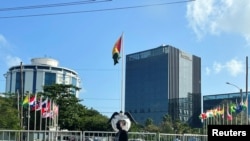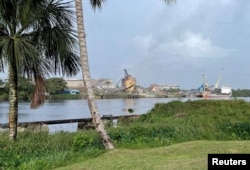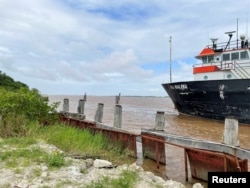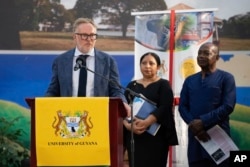Venezuela's National Assembly unanimously approved a national referendum that would seek support for Venezuela’s “defense” of the disputed Essequibo, a resource-rich strip of land controlled and administered by Guyana, “against the American empire,” Reuters reported on September 23, citing Foreign Affairs Minister Yvan Gil Pinto.
Guyana’s president Irfaan Ali responded, saying Venezuela’s move is an “affront to the rule of international law.”
Venezuelan President Nicolas Maduro parried via X, formerly known as Twitter, accusing Ali of “hypocrisy and false victimization.” Ali is “turning Guyana into a branch of ExxonMobil” and allowing the United States to turn it “into a military base against Bolivar’s Venezuela,” Maduro wrote.
The U.S. has previously denied that it has plans to set up a military base in Guyana. The Pentagon did not comment on Maduro’s latest accusation.
Maduro also claimed:
“President Irfaan Ali, enough of lies and of trying to hide the historical truth that weighs on the dispute over the Essequibo territory, whose only means of resolution, as you well know, is the Geneva Agreement of 1966.”
“The steps your government is taking violate international legality and jeopardize peace in the region.”
That is misleading.
The 1966 Geneva Agreement says that in case Venezuela and Guyana fail to resolve the border dispute peacefully, “they shall refer the decision as to the means of settlement to an appropriate international organ upon which they both agree or, failing agreement on this point, to the secretary-general of the United Nations.”
That is exactly what Guyana did: when unable to resolve the territorial dispute with Venezuela over Essequibo, Guyana appealed to the United Nations’ International Court of Justice (ICJ), through the Geneva Agreement of 1966.
Contrary to Maduro's accusations against Ali, it is his country’s move to put the “defense” of Essequibo on vote that has been seen as a violation of the Geneva agreement of 1966.
The general secretariat of the Organization of American States (OAS), whose charter has been ratified by all 35 independent North and South American states, called the Venezuelan National Assembly’s referendum “illegal according to the 1966 Geneva Agreement,” warning that such moves have been used “to justify the worst actions between States, including the crime of aggression.”
CARICOM, a 15-nation Caribbean trade bloc that includes Guyana, called Venezuela’s “stated intention” of applying “all the necessary measures” to stop Guyana from developing Essequibo’s natural resources a threat to use force “contrary to international law.”
The dispute has its roots in the colonial era.
In 1831, Britain merged several former Dutch colonial holdings, including Essequibo, into a single colony, called British Guiana (modern-day Guyana).
Venezuela did not agree with how Britain delineated British Guiana’s boundaries, arguing the Essequibo River formed a natural boundary. In 1844, Venezuela claimed all of Guiana west of the Essequibo River — roughly two-thirds of British Guiana’s territory.
In 1899, a tribunal of five arbitrators — two from Britain, two from the U.S., and one from Russia — awarded most of the disputed territory to British Guiana. Venezuela disagreed with the ruling but abided by it.
Guyana maintains that between November 1900 and June 1904, a joint Anglo-Venezuelan Boundary Commission “identified, demarcated and permanently fixed” the boundary established by the Tribunal of Arbitration award. Guyana said the commissions signed a joint report and map of the boundaries in 1905.
Venezuela later alleged that the award granting Essequibo to Guyana was the result of a political deal between Britain and Russia.
Guyana disputes that.
In 1962, Venezuela reintroduced its claim over Essequibo on the international stage, arguing the 1899 ruling was “null and void.”
In 1966, months before Guyana gained its independence, the United Kingdom and Venezuela reached the Geneva Agreement, stating that the sides would peacefully resolve the border dispute.
From 1990 to 2017, the U.N. secretary-general used the “good offices” procedure under the U.N. charter and within the framework of the 1966 Geneva Agreement to resolve this dispute.
In January 2018, after the two sides failed to reach an agreement, U.N. Secretary-General Antonio Guterres chose the ICJ “as the means to be used for the solution of the controversy.”
In March 2018, Guyana filed an application against Venezuela with the ICJ “to confirm the legal validity and binding effect” of the 1899 ruling. Maduro argued that the ICJ lacked jurisdiction to hear the case. However, the ICJ ruled in April that it had jurisdiction to hear the case.
Tensions heightened after ExxonMobil, which started oil and gas exploration activities in Guyana in 2008, made its “first significant oil find offshore Guyana” in 2015.
An ExxonMobil-led consortium that includes the American company Hess Corporation and Beijing’s China National Offshore Oil Corporation, is developing the Stabroek oil and gas block off Guyana's Atlantic coast.
In claiming Essequibo, Venezuela says the Stabroek block falls within its 200-mile exclusive economic zone (EEZ), not Guyana’s.
In 2013, Venezuela seized a U.S.-operated oil ship sailing in the area, and in 2018 it intercepted a vessel conducting a seismic survey for Exxon.
In 2020, the United States, which supports Guyana’s territorial claim, announced it would conduct joint patrols with Guyana in the disputed maritime region.
Critics of ExxonMobil have also alleged that it is unduly influencing Guyana’s government and putting the country at risk of environmental catastrophe.
Exploiting Essequibo resources could make Guyana the world’s fourth-largest offshore oil producer.
On September 25, U.S. Deputy Secretary of State Brian Nichols said Washington supports Guyana's right to develop its natural resources.








